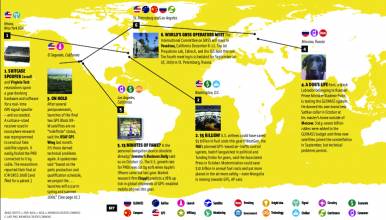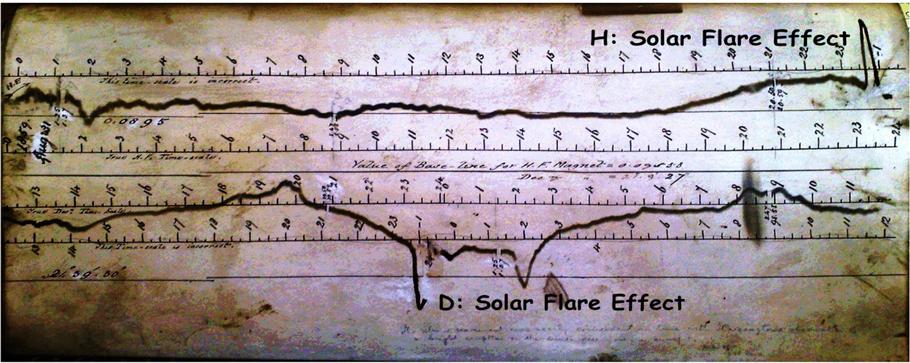 One of 12 magnetograms recorded at Greenwich Observatory during the Great Geomagnetic Storm of 1859
One of 12 magnetograms recorded at Greenwich Observatory during the Great Geomagnetic Storm of 1859 1996 soccer game in the Midwest, (Rick Dikeman image)
1996 soccer game in the Midwest, (Rick Dikeman image)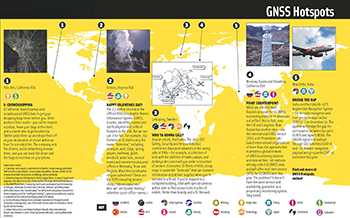
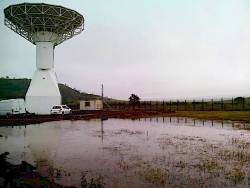 Nouméa ground station after the flood
Nouméa ground station after the flood A pencil and a coffee cup show the size of NASA’s teeny tiny PhoneSat
A pencil and a coffee cup show the size of NASA’s teeny tiny PhoneSat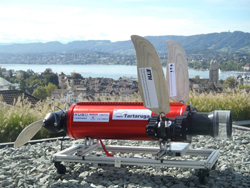 Bonus Hotspot: Naro Tartaruga AUV
Bonus Hotspot: Naro Tartaruga AUV
 Pacific lamprey spawning (photo by Jeremy Monroe, Fresh Waters Illustrated)
Pacific lamprey spawning (photo by Jeremy Monroe, Fresh Waters Illustrated) “Return of the Bucentaurn to the Molo on Ascension Day”, by (Giovanni Antonio Canal) Canaletto
“Return of the Bucentaurn to the Molo on Ascension Day”, by (Giovanni Antonio Canal) Canaletto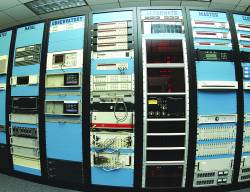 The U.S. Naval Observatory Alternate Master Clock at 2nd Space Operations Squadron, Schriever AFB in Colorado. This photo was taken in January, 2006 during the addition of a leap second. The USNO master clocks control GPS timing. They are accurate to within one second every 20 million years (Satellites are so picky! Humans, on the other hand, just want to know if we’re too late for lunch) USAF photo by A1C Jason Ridder.
The U.S. Naval Observatory Alternate Master Clock at 2nd Space Operations Squadron, Schriever AFB in Colorado. This photo was taken in January, 2006 during the addition of a leap second. The USNO master clocks control GPS timing. They are accurate to within one second every 20 million years (Satellites are so picky! Humans, on the other hand, just want to know if we’re too late for lunch) USAF photo by A1C Jason Ridder. 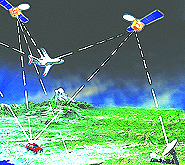 Detail of Compass/ BeiDou2 system diagram
Detail of Compass/ BeiDou2 system diagram Hotspot 6: Beluga A300 600ST
Hotspot 6: Beluga A300 600ST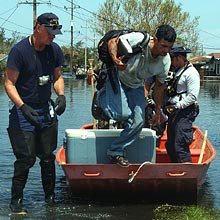

1. LATE LAUNCHES
Cape Canaveral and Plesetsk
√ [updated April 1] After three delays, a single GLONASS-M satellite will go up from Plesetsk space center on April 26. The United States will send up SVN66, the fourth GPSIIF satellite— on an Atlas V launcher for the first time—during the early evening of May 15. It had been delayed from March.
1. LATE LAUNCHES
Cape Canaveral and Plesetsk
√ [updated April 1] After three delays, a single GLONASS-M satellite will go up from Plesetsk space center on April 26. The United States will send up SVN66, the fourth GPSIIF satellite— on an Atlas V launcher for the first time—during the early evening of May 15. It had been delayed from March.
gps.gov space segment – countdown to launch
Spaceflight Now – Worldwide Launch Tracking
2. LOSING THE ORBIT?
Moscow, Russia
√ Roscosmos head Vladimir Popovkin said the geostationary orbit might be lost within 20 years if the world doesn’t unite to control space debris. He spoke at a Russian Federal Council Roundtable
on March 12. Not too long ago, the chances of a spacecraft colliding
with a one-centimeter object was once in five years. Now it’s once every
18 months or two years, he said.
Itar-TASS
[March 12, 2013] Geostationary orbit may be crammed with garbage debris in 20 years
3. JOIN THE CLUB!
Sriharikota, India
√ India will launch its first navigation satellite, IRNSS-1, this June from Satish Dhawan Space Center, said India Space Research Organization chair, Dr. K. Radhakrishnan,
on March 17. It will be tested in orbit for 3 or 4 months. When
complete, the regional system will have 7 GEO and GSO satellites.
The Hindu
[March 16 2013] India to launch first navigational satellite in June
Times of India
[March 16 2013] India to launch first navigation satellite
Inside GNSS
[January-February 2011] Indian Regional Satellite Navigation System: Correction Parameters for Timing Group Delays
4. PERMISSION DENIED
Yunnan, Southwest China
√ Surveying and mapping without government permission is a
Chinese no no and has resulted in prison for some. Foreigners are
particularly at risk. On February 28, the Yunnan bureau of the national
mapping agency (NASG) charged Coca Cola and 21 other companies with “illegal use of handheld GPS equipment to collect classified information.” Officials hadn’t counted on publicity and China is a big market for Coke, so no one is happy.
In Kunming
[March 15, 2013] China probes Cocal Cola illegal surveying allegation
Associated Press
[March 15, 2013] China accuses Coca Cola of misusing GPS equipment
China Daily
[March 15 2013] China probes Coca-Cola illegal surveying allegation
5. A FORMAL ENGAGEMENT
Tokyo, Japan
√ Japan and the United States agreed to cooperate on satellite tracking of ships in their first ever “comprehensive space dialogue”
on March 11. This reflects Japan’s unease with Chinese and North Korean
maritime activity, Japanese media said. The high-level officials also
pledged “bilateral collaboration” on the use of GPS and QZSS and in general stepped up previous cooperative efforts.
Japan-China space agreement joint statement
Japan Times
[March 12 2013 Japan] U.S. to cooperate on space debris, tracking of ships via satellite

